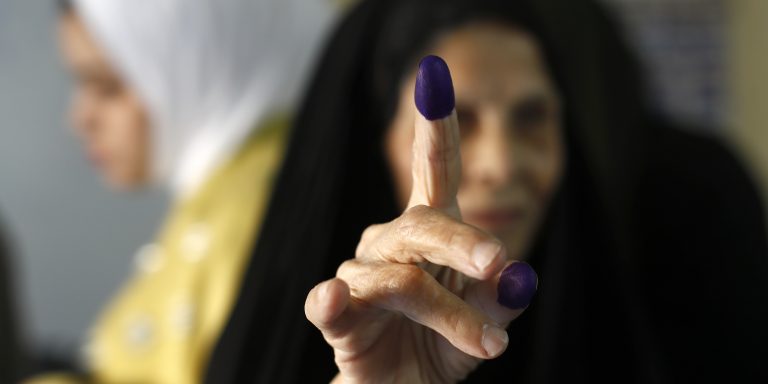INTELBRIEF
October 13, 2021
IntelBrief: Iraqi Politics Unsettled after Elections

Bottom Line up Front
- Iraq’s October 10 elections for the 329-seat National Assembly did not significantly disrupt the dominance of political blocs that have held power since the 2003 U.S.-led war to oust Saddam Hussein’s regime.
- The low turnout indicates that the election will not meaningfully reduce pervasive corruption and factionalism in Iraqi governance, or reform the economy.
- Several lists that included senior figures in Iran-backed militias fared poorly in the vote, potentially stalling Iran’s effort to exert direct influence within Iraq’s political structure.
- U.S. policy in Iraq might suffer a setback if Prime Minister Mustafa al-Kadhimi is replaced as an outcome of post-election negotiations among the major political blocs.
On October 10, eight months earlier than required by its constitution, Iraq held elections for its 329-seat National Assembly. The vote sets in motion likely protracted negotiations among leaders of the vote-getting blocs to select an executive Prime Minister and a largely ceremonial President. A longstanding informal agreement among Iraq’s major sects and ethnicities requires that a Kurd be selected as Iraq’s president, a Shia Arab serve as Prime Minister, and the speaker of the National Assembly be a Sunni Arab. Incumbent Prime Minister Mustafa al-Kadhimi assumed office in mid-2020 after civil society protests forced out his predecessor, Hayder Al Abadi, in late 2019.
The election law that controlled the October 10 vote was altered from previous laws that favored major blocs and disadvantaged reform-minded independents. However, the low voter turnout of about 41% indicated a lack of voter faith that the election would produce a solution to Iraq’s systemic problems. The powerful “Sairoon” (Moving Forward) bloc of Shia cleric Moqtada Al Sadr expanded its numbers to about 73 seats in the body, far more than the 54 seats it won in 2018 and significantly more than the seats won by the more pro-Iranian Shia-led blocs. Sadr, a mercurial Iraqi and Arab nationalist who was instrumental in the selection of the last several prime ministers, generally favors the status quo over a radical remake of the existing political and economic establishment.
The new election law that created multiple districts within each province enabled more “independents” to win seats (compared to 2018). However, it is not clear how many of them are supporters of the 2019 protest movement who might support new laws to reduce pervasive corruption or government factionalism. Reformist voters might be further disillusioned by reports that some of the major Shia political leaders are expressing distrust of the election process entirely, although they stopped short of alleging massive fraud.
Indicative of its stake in the Iraqi election, Iran sought to use the Iraq vote to implement its regional “playbook” – a strategy to lift Iranian allies to power using established electoral and political processes. Tehran’s objective is to replace Prime Minister Mustafa al-Kadhimi with an Iraqi leader who will pressure the Biden administration to withdraw all U.S. forces from Iraq immediately and suppress critics of Tehran’s influence on Iraq’s politics and economy. Iran’s Islamic Revolutionary Guard Corps –Qods Force (IRGC-QF) orchestrated its main Iraqi ally, the Shia militia Kata’ib Hezbollah, to field 31 candidates under a “Huquq (Rights) Movement” banner. Not only did this list garner few votes, but the Fatah (Conquest) list, which includes the key Iran-backed militias Badr Organization and Asa’ib Ahl al-Haq, apparently won fewer than the 48 seats it won in 2018. The poor performance of the most pro-Iranian candidates - whose militias were widely blamed for suppressing the 2019 protests – is likely to complicate Iran’s efforts to achieve its objectives in the Iraq vote. A modest bright spot for Tehran was the rebound of one ally, the State of Law list headed by former Prime Minister Nuri al-Maliki, from its dismal 2018 showing. Maliki’s Iran-endorsed sectarian policies inadvertently facilitated the rise of the Islamic State insurgency in 2014. Even before preliminary results were available, IRGC-QF commander Esma’il Qaani reportedly arrived in Baghdad the day of the vote, presumably to try to forge a Tehran-friendly coalition that might change the prime minister. However, Sadr’s electoral strength renders him as the post-election “kingmaker,” and it is unclear what combination of threats or incentives Tehran might put forward to persuade its erstwhile ally to back a prime minister more to Iran’s liking.
Another major outside stakeholder in the election is the United States, and the Biden administration is widely understood to want Kadhimi to receive another term. The incumbent has faced down pressure from Iran-backed leaders who want to end the U.S. military presence in Iraq, arguing that expelling U.S. advisers would leave Iraqi forces ineffective against remnants of the Islamic State organization (ISIS). Unfolding events in Afghanistan may well help his argument. Kadhimi also supports accountability for abuses against critics of government corruption, factionalism, and nepotism – a stance that the United States applauds. Yet, Biden administration officials have no institutional or personal ties to Sadr, and limited leverage over other factions likely to have a significant say in whether Kadhimi stays. Still, the election did not yield a conclusive mandate for fundamental political change, and there are risks of further disillusionment among Iraqi citizens with the prospect for democracy and reform. The election might, by default, leave the most pro-U.S. prime ministerial choice in office for another term.